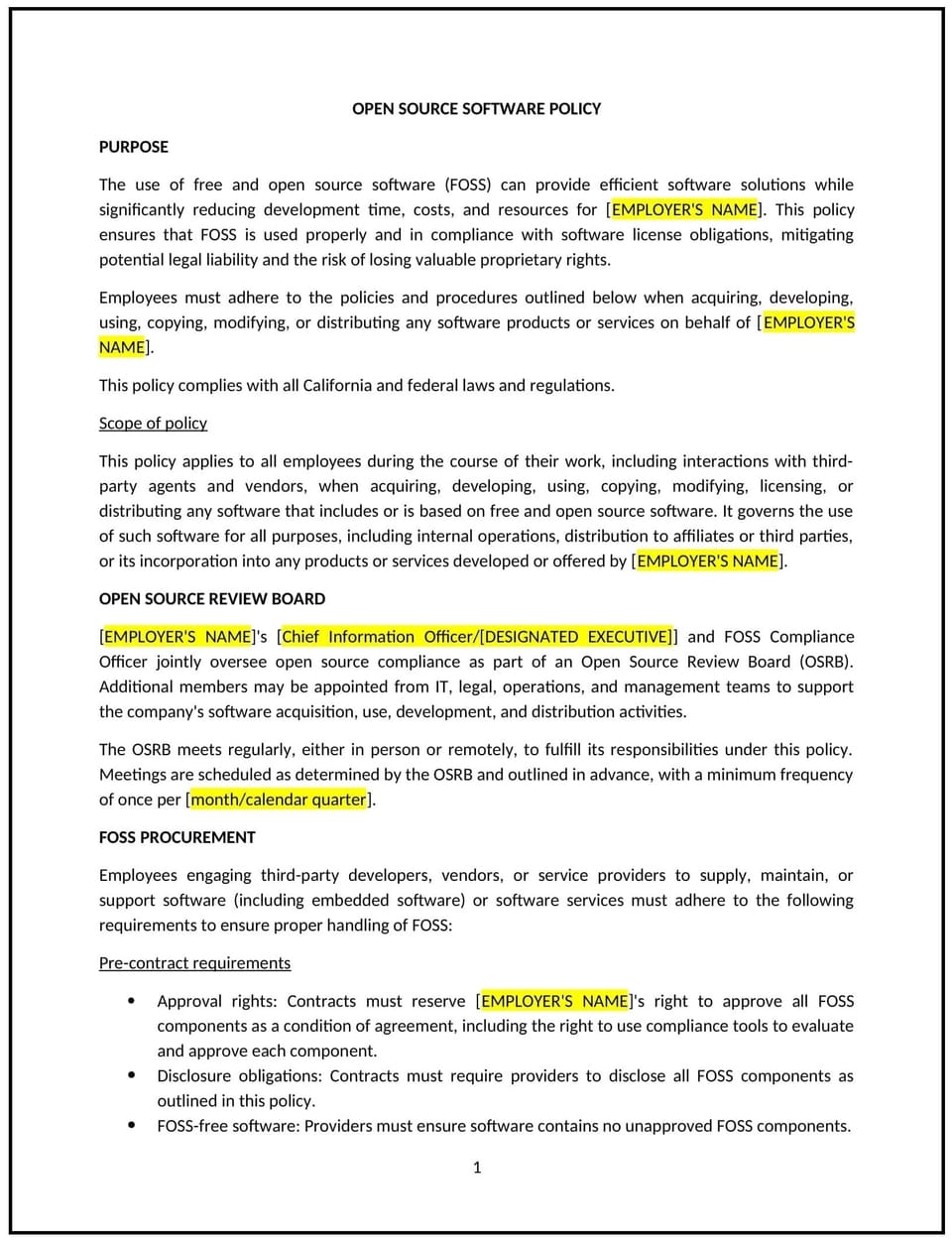Open source software policy (California): Free template

Open source software policy (California)
In California, an open source software policy provides businesses with guidelines for using, contributing to, and distributing open source software (OSS). This policy helps manage legal, security, and operational risks while supporting compliance with state and federal intellectual property laws.
This policy outlines acceptable use, contribution procedures, and compliance requirements for employees working with OSS. By implementing this policy, California businesses can leverage the benefits of OSS while maintaining proper safeguards and legal protections.
How to use this open source software policy (California)
- Define acceptable use: Specify the types of open source software employees may use, ensuring alignment with business objectives and security standards.
- Establish contribution guidelines: Provide clear rules for employees contributing to open source projects, including obtaining necessary approvals.
- Address licensing compliance: Outline steps to ensure OSS licenses are properly adhered to when using or modifying software.
- Implement security protocols: Require that OSS undergo security reviews before being integrated into business systems or products.
- Monitor distribution: Prohibit unauthorized distribution of OSS to third parties and ensure all distributions comply with applicable licenses.
Benefits of using this open source software policy (California)
This policy offers several advantages for California businesses:
- Supports compliance: Ensures adherence to intellectual property laws and OSS licensing requirements.
- Protects business assets: Minimizes risks of security vulnerabilities, license violations, and reputational damage.
- Promotes consistency: Establishes clear rules for employees working with OSS, reducing confusion and errors.
- Encourages innovation: Provides a framework for safely leveraging OSS to enhance business operations.
- Reduces risks: Helps prevent legal and operational issues associated with improper OSS use or distribution.
Tips for using this open source software policy (California)
- Reflect California-specific laws: Ensure compliance with state intellectual property regulations alongside federal laws.
- Train employees: Provide education on OSS licensing, security risks, and the business’s policies for using and contributing to OSS.
- Conduct regular audits: Review OSS use in the business’s operations to identify and address potential compliance or security issues.
- Use secure practices: Require employees to follow cybersecurity best practices when integrating OSS into business systems.
- Review regularly: Update the policy to reflect changes in California laws, OSS licensing standards, or business technology needs.
Q: How does this policy benefit the business?
A: This policy supports compliance with intellectual property laws, protects business systems, and ensures proper use of OSS to mitigate risks.
Q: What steps should employees take before using OSS in business systems?
A: Employees should seek approval from their manager or IT department, conduct a license review, and ensure the software passes a security assessment.
Q: How does this policy support compliance with California laws?
A: The policy reflects state and federal intellectual property laws, ensuring lawful use and distribution of OSS.
Q: What are employees’ responsibilities when contributing to OSS projects?
A: Employees must obtain approval for contributions, avoid sharing proprietary information, and adhere to the licensing terms of the project.
Q: How can the business monitor OSS compliance?
A: The business can conduct regular audits, maintain records of OSS use, and provide training to ensure adherence to licensing and security requirements.
This article contains general legal information and does not contain legal advice. Cobrief is not a law firm or a substitute for an attorney or law firm. The law is complex and changes often. For legal advice, please ask a lawyer.


